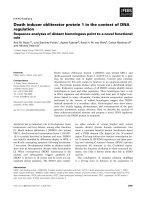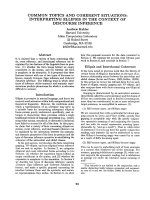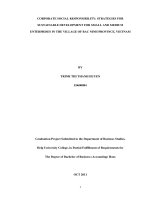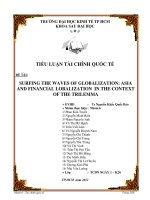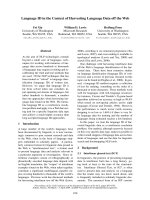The UN Model Double Taxation Convention in the context of Financing for Sustainable Development
Bạn đang xem bản rút gọn của tài liệu. Xem và tải ngay bản đầy đủ của tài liệu tại đây (777.83 KB, 14 trang )
The UN Model Double Taxation
Convention in the context of Financing
for Sustainable Development
Alexander Trepelkov
Director, Financing for Development Office
Department of Economic and Social Affairs
/>
UN Work in International Tax Cooperation
Economic and
Social Council
(ECOSOC)
Relationship between international
tax cooperation and financing for
development emphasized in:
UN Committee of Experts on
International Cooperation in
Tax Matters (subsidiary body
of ECOSOC)
Financing for Development Office
(FfDO) - Provides secretariat
support to the Committee
2002 Monterrey Consensus;
2008 Doha Declaration on
Financing for Development;
Outcome of 2009 Financial Crisis
Conference;
Outcome of 2010 MDG Summit
Rio+20 Conference on Sustainable
Development.
Committee of Experts
Mandate
• Keep under review and update as necessary the UN Model
Double Taxation Convention between Developed and
Developing Countries and the Manual for the Negotiation of
Bilateral Tax Treaties between Developed and Developing
Countries.
• Provide a framework for dialogue with a view to enhancing
and promoting cooperation among national tax authorities
and assess how new and emerging issues could affect this
cooperation.
• Make recommendations on capacitybuilding and technical assistance.
Special attention given to developing countries
and countries with economies in transition
Committee of Experts
• Major recent achievement:
2011 update of the UN Model
Double Taxation Convention
• Comprises 25 members acting in their personal
capacity.
• Nominated by Governments and appointed by the
UN Secretary-General
• Selected to reflect an adequate equitable
geographical distribution, representing different tax
systems.
Double Tax Treaties, Model
Conventions and UN Model
Double tax treaties aim to prevent having income from
cross-border investment taxed twice (i.e. both in the host country of the
Why do countries need Double Tax Treaties?
investment and in the residence country of the investor), by allocating
taxing rights over this income between the two countries.
Double Taxation Convention Models are generally used by countries
as a Double Taxation Convention Models important?
Why are basis for the negotiation of their bilateral treaties; thus they
have a profound influence on international tax treaty practice.
The UN Model Convention seeks to assist developing countries in drafting and
negotiating bilateral tax treaties, with a view to maintaining the desired balance
What isobtaining more tax revenue from foreign investment and
special about the UN Model Convention?
between
preserving investment-friendly climate, in support of their development goals.
Application of Double Tax Treaties
Developed
Country R
R-Corporation
Royalties taxable under
domestic law (residence
country taxation)
Risks:
ns
e
- Discourage from licensing
Avoidance of double
taxation by appropriately
distributing the taxing
rights over royalties
between the two countries
S-Corporation
Roy
altie
s
Lic
e
Tax Treaty
Developing
Country S
- Higher royalties
- No transfer of technology
and business skills
- Development goals might
be jeopardized
Royalties taxable under
domestic law (source
country taxation)
UN and Other Model Conventions
Developed
Country R
R-Corporation
OECD Model
Roy
altie
s
UN Model
Limited
Taxing
Rights
Developing
Country S
Exclusive
taxing rights
ns
e
Double
- tax
relief
Lic
e
Right
to tax
No taxing
rights
S-Corporation
Role of Double Taxation Conventions
• Double Taxation Conventions seek to:
- protect taxpayers against double taxation of the same
income;
- promote the flow of international trade and
investment;
- provide a framework of legal and fiscal certainty to
investors;
- prevent discrimination between foreign investors and
local taxpayers;
- improve cooperation between tax authorities.
Double Taxation Convention Models
UN Model Double
Taxation Convention
OECD Model Tax
Convention on
between Developed and
Developing Countries
Income and on
Capital
UN and OECD Model Convention
Residence
Country
Taxing
Rights
Taxing
Rights
Investor
Taxing
Rights
Source
Country
Taxing
Rights
Investment
Objectives of the 2011 Update
• Take into account recent developments in the area
of international tax policies of both developing and
developed countries.
• Seek further consistency with the OECD Model,
where in line with the priorities of developing
countries.
• Further clarify and improve the operation of
provisions aimed to prevent double taxation over
income from cross-border investments.
Main features of the 2011 Update
• Modified version of Article 13, paragraph 5, to address
possible abuses.
• Optional version of Article 25, providing for mandatory
binding arbitration.
• New version of Article 26, confirming and clarifying the
importance of exchange of information.
• New Article 27 on “Assistance in the Collection of
Taxes”.
• All changes in the above Articles accompanied by
corresponding changes in the relevant Commentaries.
Other Changes in the Commentaries
•
•
•
•
•
Commentary to Art. 1 now includes a survey of approaches
generally adopted by countries to deal with cases of improper
use of tax treaties.
Commentary to Art. 5 has been generally updated and an
alternative text of Art. 5 has been provided for cases where
countries delete Art. 14.
Commentary to Art. 7 confirms that the OECD’s approach to
attribute profits to permanent establishments has not been
adopted.
Commentaries to Art. 10, 11, 12 now incorporate text on
the beneficial ownership requirement drawn from the
Commentaries to the OECD Model.
Commentary to Art. 11 has been updated to clarify that the
definition of interest applies to proceeds from certain Islamic
financial instruments.
Thank you



